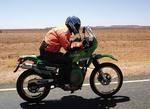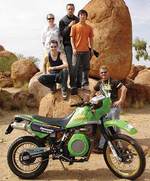Solar challenge award for biodiesel bike
 Engineering Engineering
A University of Adelaide student-run team that designed and built a biodiesel motorcycle has won a major award in the Greenfleet Technology Class of the 2007 Panasonic World Solar Challenge. Called "BioBike", the biodiesel motorbike won the award for Best Environmental Profile - that is, the vehicle that generated the least greenhouse gas emissions. Releasing just 71 grams of carbon dioxide per kilometre travelled, the BioBike completed the 3000km trek between Darwin and Adelaide in seven days. Its fuel efficiency was 3.5 litres per 100km. The BioBike was conceived by Dr Colin Kestell, Coordinator of the Automotive Engineering program at the University of Adelaide, and designed and built by students within the School of Mechanical Engineering. Dr Kestell and his students rode the BioBike from Darwin to Adelaide, with strong support from apprentice mechanics from crane company HIAB Australia. "We're really thrilled to have won the award for the least carbon emissions," Dr Kestell said. "It shows that biodiesel can be used to power a commercial-type vehicle over long distances, and that it can have a significant positive impact on the environment." Sara Gipton, CEO of Greenfleet Australia, said Greenfleet was very excited about the BioBike. "Using a lower carbon fuel is part of the solution to reducing transport emissions," Ms Gipton said. "This is a good first step in an iconic event to demonstrate the potential for alternative fuels and vehicle technologies to revolutionise personal transport." The BioBike was one of two University of Adelaide entries in the Greenfleet Class of the World Solar Challenge - the other was the canola oil-powered, three-wheeled Eco Trike. This team involved students from the School of Mechanical Engineering as well as the apprentice mechanics from HIAB Australia, who also lent much-needed support to the BioBike. Dr Kestell said the event was not without incident for the BioBike team, but that helped to enhance his students' learning experience. "I would rather go through an event like this with a number of incidents than for nothing to occur, because if there are no incidents then it's just another bike ride," he said. "We had multiple breakdowns and repairs, we employed a bit of bush mechanics, we received help from other teams and from locals along the way, as well as the University itself. A great positive to come from all this is that the students had the benefit of all of that experience, which they wouldn't have had otherwise." Dr Kestell said the BioBike has been a successful project in many different ways, and has garnered a lot of public interest. "We're really pleased that in the last couple of years we've taken the concept of the biodiesel bike and made it a reality," he said. "In September 2005 we came up with the idea, last year the students designed and built a working proof-of-concept bike, and this year they have designed and built a road registered version that has just been ridden 3000km across Australia. That's a great achievement, and to top it off with this award is better still." Story by David Ellis
|






